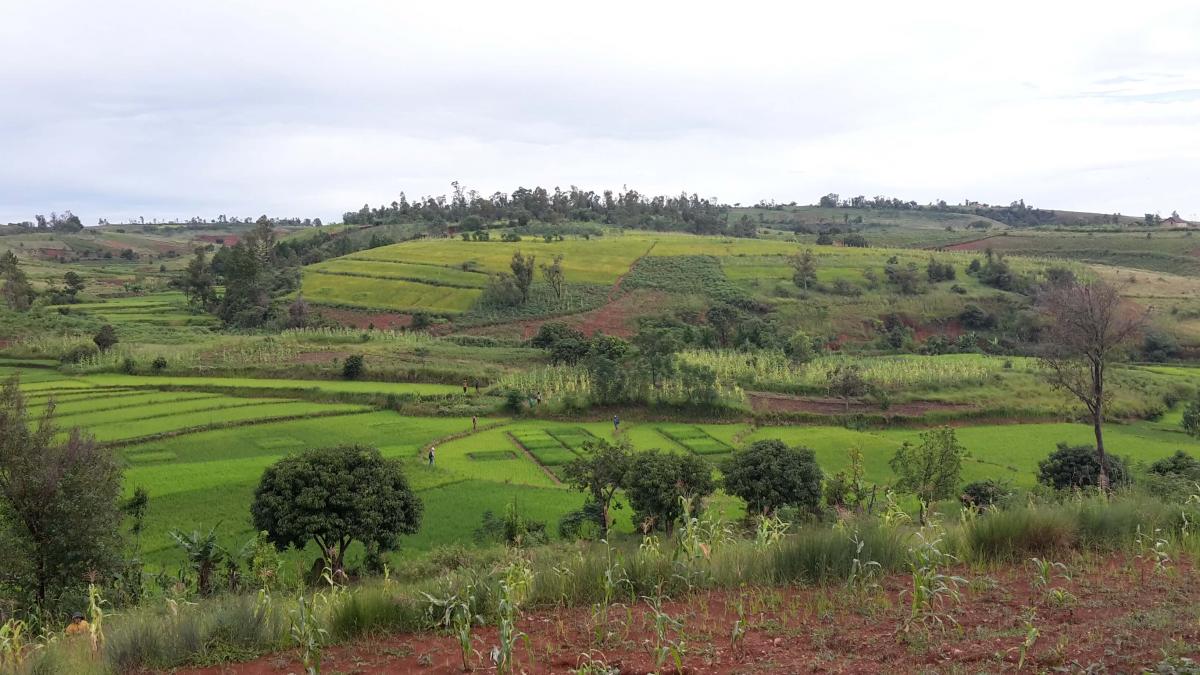- Home
- Worldwide
- CIRAD worldwide
- Projects
- DINAAMICC Project
Integrated approaches and support for innovative and climate-resilient family farming in Madagascar - DINAAMICC

Agronomic trials in rice-growing valleys © Bertrand Muller, CIRAD
Issues
Madagascar is the world’s fourth poorest country and one of the most vulnerable to climate change. The rise in temperatures, the reduction in rainfall and its increased variability, and the frequency and intensity of climate hazards are all seriously affecting agricultural production. Added to that are unsustainable practices and a huge increase in biotic constraints. These problems are particularly acute in the Central Highlands of Madagascar, which also have some of the highest malnutrition rates in the country.
Agriculture is a vital sector in terms of economic development, poverty reduction and food and nutrition security. The sector needs to integrate sustainable practices adapted to the situations and to the growing constraints faced by small family farms (FFs). The challenge is therefore to combine supported production systems that contribute to food security, environmental protection and compliance with the country’s mitigation commitments, and to make an agroecological transition possible.
Description
The DINAAMICC project operates in upland parts of the three central regions of the Highlands of Madagascar – Analamanga, Itasy and Vakinankaratra –, in particular in pilot zones selected according to an anthropisation gradient. To reduce the vulnerability of FFs to climate and environmental change, the project strives to: resolve some of the acute biotic constraints they face; to improve the range of appropriate agroecological practices; to promote these practices; and to build actors’ capacities by developing linkages between research, development and the farming world. The project will adopt an integrated, multidisciplinary and participatory approach, with exchanges between farmers, farmer organisations (FOs), NGOs, other development actors and agricultural research organisations.
Expected results
- The acquisition and sharing – by research and development actors – of in-depth knowledge of the situations and constraints faced by FFs, in particular due to climate change, and of the interests and constraints of some of the adaptation actions implemented so far;
- The co-development and co-assessment by research and development actors, in partnership with farmers and FOs, of practices enabling FFs to be more resilient and sustainable in their immediate environment;
- agroecological pest control;
- varieties to improve the resilience of FFs and food supply;
- agriculture-livestock-agroforestry integration;
- water conservation and distribution practices;
- a multi-criteria, multi-level assessment framework to promote agroecological practices and the sustainable management of resources by FFs;
- The promotion of appropriate innovations among a large number of FFs and FOs:
- agroecological practices of interest;
- better food practices in connection with the diversification of production.
- Strengthening the capacities of FOs and research and development actors to help the rural world to adapt to climate and environmental change:
- meteorological infrastructure and information for the farming world;
- farmer seed distribution systems;
- small infrastructure and various equipment for use by FOs;
- operational capacities of FOs and research and development actors to understand the changes underway;
- training for young researchers (8 theses) and students.























